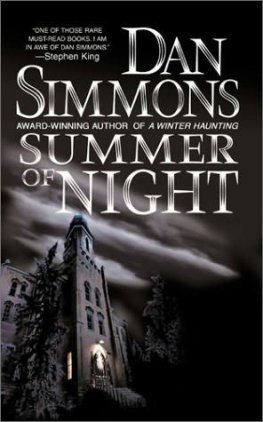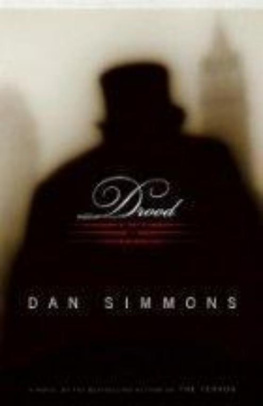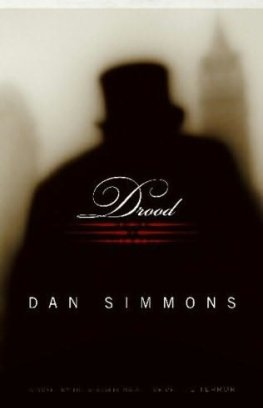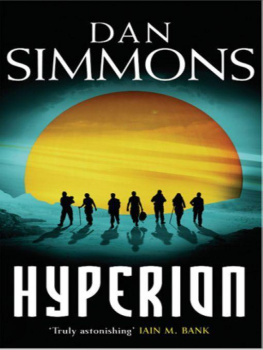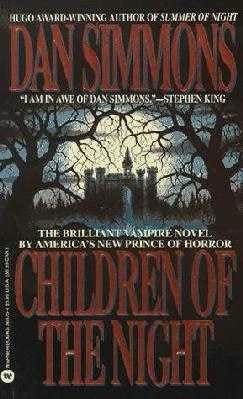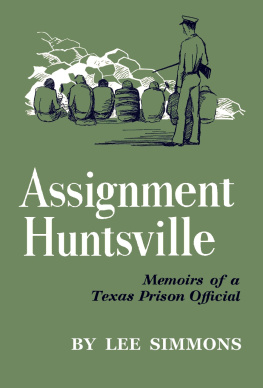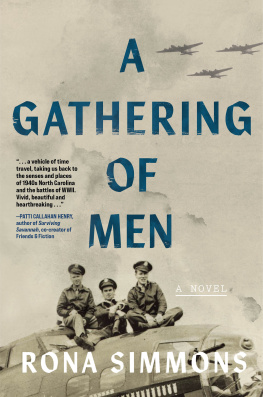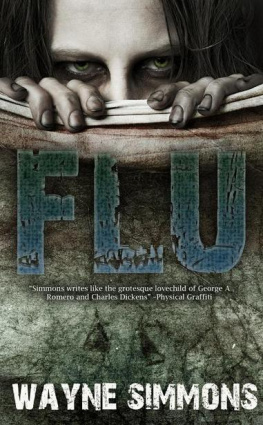Dan Simmons - The Terror
Here you can read online Dan Simmons - The Terror full text of the book (entire story) in english for free. Download pdf and epub, get meaning, cover and reviews about this ebook. year: 2007, publisher: Little, Brown and Company, genre: Adventure. Description of the work, (preface) as well as reviews are available. Best literature library LitArk.com created for fans of good reading and offers a wide selection of genres:
Romance novel
Science fiction
Adventure
Detective
Science
History
Home and family
Prose
Art
Politics
Computer
Non-fiction
Religion
Business
Children
Humor
Choose a favorite category and find really read worthwhile books. Enjoy immersion in the world of imagination, feel the emotions of the characters or learn something new for yourself, make an fascinating discovery.

- Book:The Terror
- Author:
- Publisher:Little, Brown and Company
- Genre:
- Year:2007
- Rating:4 / 5
- Favourites:Add to favourites
- Your mark:
- 80
- 1
- 2
- 3
- 4
- 5
The Terror: summary, description and annotation
We offer to read an annotation, description, summary or preface (depends on what the author of the book "The Terror" wrote himself). If you haven't found the necessary information about the book — write in the comments, we will try to find it.
The Terror — read online for free the complete book (whole text) full work
Below is the text of the book, divided by pages. System saving the place of the last page read, allows you to conveniently read the book "The Terror" online for free, without having to search again every time where you left off. Put a bookmark, and you can go to the page where you finished reading at any time.
Font size:
Interval:
Bookmark:
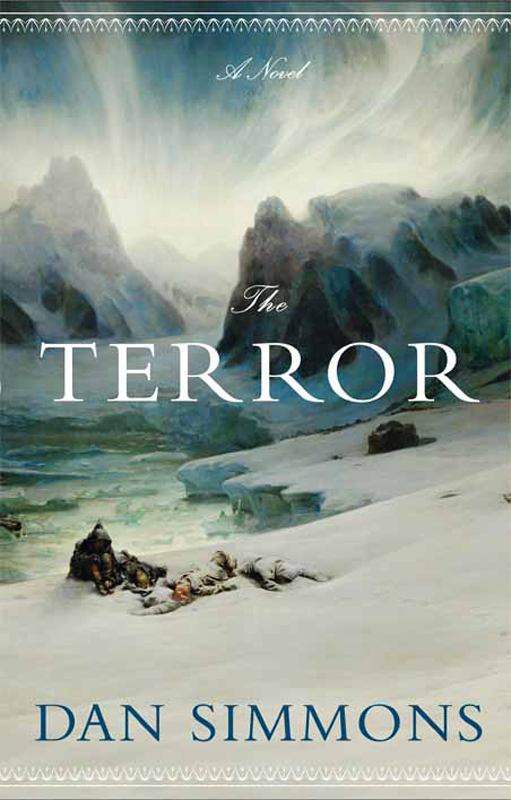
Copyright 2007 by Dan Simmons
All rights reserved. Except as permitted under the U.S. Copyright Act of 1976, no part of this publication may be reproduced, distributed, or transmitted in any form or by any means, or stored in a database or retrieval system, without the prior written permission of the publisher.
Little, Brown and Company
Hachette Book Group
237 Park Avenue
New York, NY 10017
Visit our website at www.HachetteBookGroup.com.
The Warner Books name and logo are trademarks of Hachette Book Group, Inc.
First eBook Edition: March 2007
ISBN: 978-0-316-00388-9
Also by Dan Simmons
Song of Kali
Phases of Gravity
Carrion Comfort
Hyperion
The Fall of Hyperion
Prayers to Broken Stones
Summer of Night
The Hollow Man
Children of the Night
Summer Sketches
Lovedeath
Fires of Eden
Endymion
The Rise of Endymion
The Crook Factory
Darwins Blade
A Winter Haunting
Hardcase
Hard Freeze
Worlds Enough & Time
Ilium
Hard as Nails
Olympos
This book is dedicated, with love and many thanks for the indelible Arctic memories, to Kenneth Tobey, Margaret Sheridan, Robert Cornthwaite, Douglas Spencer, Dewey Martin, William Self, George Fenneman, Dmitri Tiomkin, Charles Lederer, Christian Nyby, Howard Hawkes, and James Arness.
May 19, 1845: HMS Erebus and HMS Terror with 129 men depart England
- Late July 1845: Ships last seen by whalers in Baffin Bay
- Winter 184546: Ships frozen in at Beechey Island
- Sept. 1846April 22, 1848: Ships frozen in place at Lat. 70-05 N., Long. 98-23 W
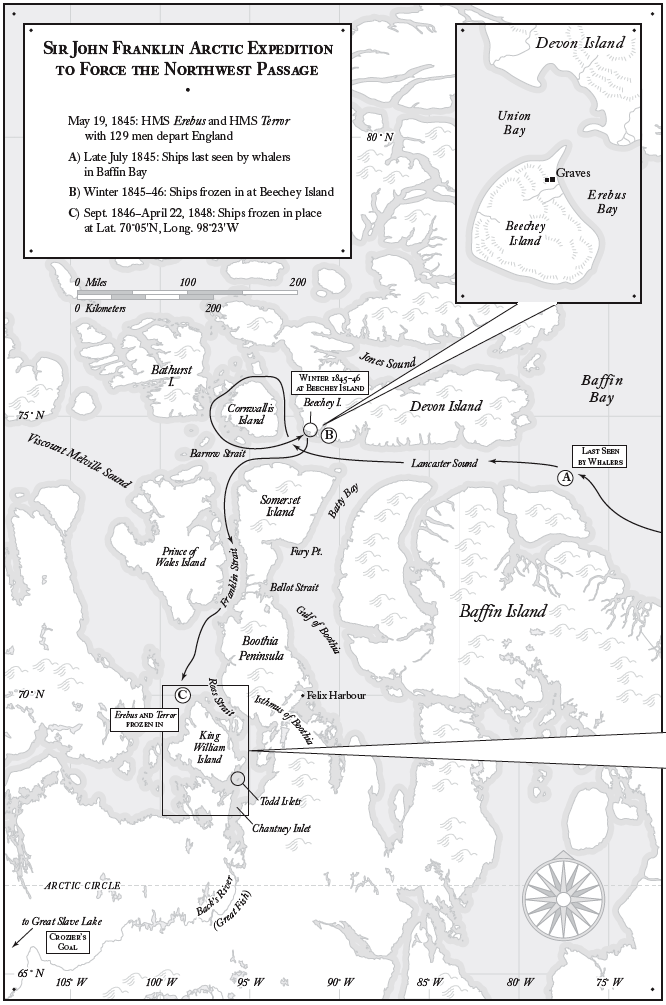
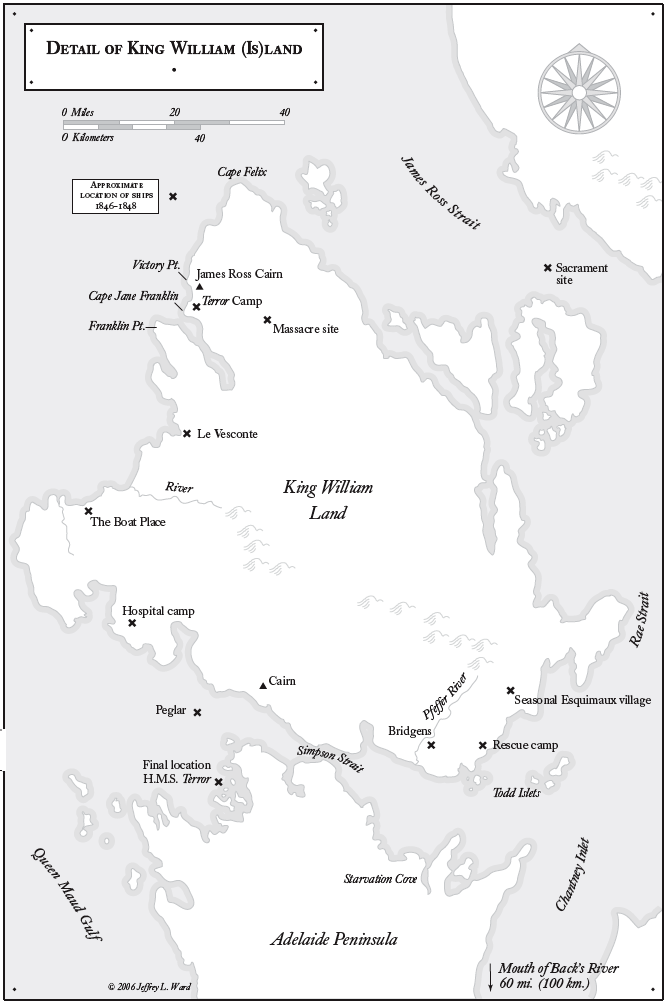
This elusive quality it is, which causes the thought of whiteness, when divorced from more kindly associations, and coupled with any object terrible in itself, to heighten that terror to the furthest bounds. Witness the white bear of the poles, and the white shark of the tropics; what but their smooth, flaky whiteness makes them the transcendent horrors they are? That ghastly whiteness it is which imparts such an abhorrent mildness, even more loathesome than terrific, to the dumb gloating of their aspect. So that not the fierce-fanged tiger in his heraldic coat can so stagger courage as the white-shrouded bear or shark.
HERMAN MELVILLE
Moby Dick (1851)
CROZIER
Lat. 70-05 N., Long. 98-23 W.
October, 1847
C aptain Crozier comes up on deck to find his ship under attack by celestial ghosts. Above him above Terror shimmering folds of light lunge but then quickly withdraw like the colourful arms of aggressive but ultimately uncertain spectres. Ectoplasmic skeletal fingers extend toward the ship, open, prepare to grasp, and pull back.
The temperature is 50 degrees Fahrenheit and dropping fast. Because of the fog that came through earlier, during the single hour of weak twilight now passing for their day, the foreshortened masts the three topmasts, topgallants, upper rigging, and highest spars have been removed and stored to cut down on the danger of falling ice and to reduce the chances of the ship capsizing because of the weight of ice on them stand now like rudely pruned and topless trees reflecting the aurora that dances from one dimly seen horizon to the other. As Crozier watches, the jagged ice fields around the ship turn blue, then bleed violet, then glow as green as the hills of his childhood in northern Ireland. Almost a mile off the starboard bow, the gigantic floating ice mountain that hides Terrors sister ship, Erebus, from view seems for a brief, false moment to radiate colour from within, glowing from its own cold, internal fires.
Pulling up his collar and tilting his head back, out of forty years habit of checking the status of masts and rigging, Crozier notices that the stars overhead burn cold and steady but those near the horizon not only flicker but shift when stared at, moving in short spurts to the left, then to the right, then jiggling up and down. Crozier has seen this before in the far south with Ross as well as in these waters on earlier expeditions. A scientist on that south polar trip, a man who spent the first winter in the ice there grinding and polishing lenses for his own telescope, had told Crozier that the perturbation of the stars was probably due to rapidly shifting refraction in the cold air lying heavy but uneasy over the ice-covered seas and unseen frozen landmasses. In other words, over new continents never before seen by the eyes of man. Or at least, Crozier thinks, in this northern arctic, by the eyes of white men.
Crozier and his friend and then-commander James Ross had found just such a previously undiscovered continent Antarctica less than five years earlier. They named the sea, inlets, and landmass after Ross. They named mountains after their sponsors and friends. They named the two volcanoes they could see on the horizon after their two ships these same two ships calling the smoking mountains Erebus and Terror. Crozier was surprised they hadnt named some major piece of geography after the ships cat.
They named nothing after him. There is, on this October winters dark-day evening in 1847, no arctic or antarctic continent, island, bay, inlet, range of mountains, ice shelf, volcano, or fucking floeberg which bears the name of Francis Rawdon Moira Crozier.
Crozier doesnt give the slightest God-damn. Even as he thinks this, he realizes that hes a little bit drunk. Well, he thinks, automatically adjusting his balance to the icy deck now canted twelve degrees to starboard and down eight degrees by the bow, Ive been drunk more often than not now for three years, havent I? Drunk ever since Sophia. But Im still a better sailor and captain drunk than that poor, unlucky bastard Franklin ever was sober. Or his rosy-cheeked lisping pet poodle Fitzjames, for that matter.
Crozier shakes his head and walks down the icy deck forward to the bow and toward the only man on watch he can make out in the flickering light from the aurora.
It is short, rat-faced Cornelius Hickey, caulkers mate. The men look all the same out here on watch in the dark, since theyre all issued the same cold-weather slops: layers of flannel and wool covered with a heavy waterproof greatcoat, bulbous mittens protruding from voluminous sleeves, their Welsh wigs heavy watch caps with floppy ears pulled tight, often with long comforters scarves wrapped around their heads until only the tips of their frostbitten noses are visible. But each man layers or wears his cold-weather slops slightly differently adding a comforter from home, perhaps, or an extra Welsh wig tugged down over the first, or perhaps colorful gloves lovingly knit by a mother or wife or sweetheart peeking out from under the Royal Navy outer mittens and Crozier has learned to tell all fifty-nine of his surviving officers and men apart, even at a distance outside and in the dark.
Hickey is staring fixedly out beyond the icicle-sheathed bowsprit, the foremost ten feet of which are now embedded in a ridge of sea ice, as HMS
Font size:
Interval:
Bookmark:
Similar books «The Terror»
Look at similar books to The Terror. We have selected literature similar in name and meaning in the hope of providing readers with more options to find new, interesting, not yet read works.
Discussion, reviews of the book The Terror and just readers' own opinions. Leave your comments, write what you think about the work, its meaning or the main characters. Specify what exactly you liked and what you didn't like, and why you think so.

